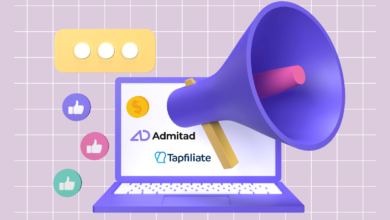Boost Affiliate Marketing with AI Tools

Is managing your affiliate and referral programs starting to feel overwhelming? With AI, you can automate many of the time-consuming tasks that typically bog down program managers, making AI a game-changer in streamlining your processes.
AI is transforming how businesses manage affiliate programs by handling repetitive tasks, instantly analyzing performance data, and offering real-time insights. Imagine knowing which affiliates and partners are driving the most value, optimizing campaigns in real time, and even generating personalized content with just a few clicks.
Whether you’re looking to scale your eCommerce or SaaS business through affiliate marketing or optimize an existing program, AI helps you save time, increase your ROI, and focus on growth.
This guide explores the top AI tools and strategies designed to help you automate, optimize, and elevate your affiliate marketing efforts.
What is AI in Affiliate Marketing?
In affiliate marketing, AI (Artificial Intelligence) uses advanced technologies like machine learning and natural language processing (NLP) to supercharge your strategies. Think of it as your personal assistant that processes huge amounts of data, finds patterns, predicts future trends, and automates tasks that would normally take up your valuable time.
For example, machine learning algorithms can predict which products will appeal to certain customers, and NLP tools can generate personalized content—like product descriptions or blog posts—based on user preferences.
Even those tedious tasks, like optimizing ads or tracking consumer behavior across different platforms, can be automated, freeing you up to focus on the bigger picture.
Using AI in affiliate marketing allows you to:
- Track and analyze behavior: AI tools monitor how users interact with your content across different platforms, giving you insights into evolving affiliate marketing trends and what’s working.
- Optimize ad placements: AI algorithms ensure your ads appear in the right places to get maximum conversions, reducing your costs and boosting your ROI.
- Generate personalized content: With AI tools like ChatGPT, you can create compelling, SEO-optimized copy that connects with your target audience.
- Automate repetitive tasks: From sending follow-up emails to managing customer queries with chatbots, AI lets you automate the grunt work, improving efficiency and saving time.
At its core, AI helps you make smarter, data-driven decisions and automates tasks, so you can spend more time growing your business and less time on manual work.
How AI is Revolutionizing Affiliate Marketing
AI is transforming how you manage affiliate marketing, making workflows more efficient and intelligent. Using affiliate marketing with AI allows you to focus on higher-level strategies while automating tedious tasks. It’s not just about handling tasks better—it’s about reshaping your approach entirely. Here’s where AI is making the biggest impact:
1. Predictive Analytics and Behavioral Insights
Imagine being able to predict what your audience wants before they even realize it. That’s the power of AI’s predictive analytics. By analyzing past behaviors, AI tells you exactly which products are most likely to resonate with specific audience segments.
For example, Companies like Optmyzr have successfully streamlined their affiliate marketing efforts by leveraging automated solutions to optimize performance and improve ROI, which demonstrates the real impact AI-driven approaches can have on scaling campaigns effectively.
2. Automating Repetitive Tasks
Think about the hours you spend on repetitive tasks—writing product descriptions, scheduling social media posts, following up on leads.
AI can handle these tasks for you. From generating fresh content to automating email sequences, AI frees you from the daily grind. You can even automate customer interactions through chatbots, allowing your audience to get instant responses while you focus on higher-level strategy.
3. Improved Content Personalization
AI elevates personalization in affiliate marketing, and when you combine it with AI tools, you can create experiences that deeply engage your audience. Instead of sending generic messages, AI helps you deliver personalized content based on each user’s preferences, habits, and past interactions.
For instance, if someone frequently engages with eco-friendly products, AI can automatically suggest relevant content or offers tailored to their interests. This level of personalization not only improves engagement but also leads to higher conversions.
4. Real-Time Campaign Optimization
With AI, you don’t need to constantly tweak and monitor your campaigns. AI tools optimize your campaigns in real-time, adjusting things like ad placements or bidding strategies based on live data. This ensures that your ads are being shown to the right audience at the right time, maximizing your ROI without requiring your constant attention.
With these AI capabilities at your fingertips, you can make smarter decisions, drive better results, and scale your efforts more effectively than ever before.
AI tools are revolutionizing affiliate marketing by automating tasks, optimizing performance, and providing real-time insights that help marketers make smarter, data-driven decisions. Whether you’re looking to streamline content creation, manage campaigns, or engage with your audience more effectively, the right AI tools can make a significant difference in your marketing efforts.
Here are the top AI tools designed to enhance affiliate marketing:
1. Content Creation and Optimization Tools
Creating compelling, SEO-friendly content is critical for affiliate marketers. These AI tools help you generate content faster, optimize it for search engines, and keep your audience engaged.
- ChatGPT: As an AI tool developed by OpenAI, ChatGPT is highly effective in generating human-like content and has been notably successful in gathering information from thousands of data points. It’s invaluable for affiliate marketers needing help with brainstorming ideas, writing engaging blog posts, product descriptions, or automating conversations. ChatGPT not only generates compelling content but also enhances SEO processes, making it an essential tool for marketers aiming to automate and refine their strategies.


- Anyword: Anyword takes personalized content to the next level by using AI-driven predictive performance scores. This tool helps you write copy that resonates with specific audiences and optimizes for conversions. Whether it’s ad copy, landing pages, or product descriptions, Anyword ensures your content hits the mark.


2. SEO and Analytics Tools
Tracking and improving your content’s performance is key to long-term success in affiliate marketing. These AI-powered tools help you gain insights, optimize campaigns, and ensure your content ranks well on search engines.
- Ahrefs: One of the leading tools in the SEO space, Ahrefs leverages AI to provide in-depth keyword research, backlink analysis, and competitive insights. It’s invaluable for affiliate marketers who rely heavily on organic traffic to drive conversions. Ahrefs helps you discover high-performing keywords, analyze your competitors’ content, and monitor backlinks, ensuring that your marketing efforts are well-informed and strategic. In addition to its comprehensive site audit tools, Ahrefs is essential for scaling your organic search traffic and maximizing your affiliate campaigns’ reach.


3. Campaign Management and Optimization Tools
Running efficient campaigns is crucial to affiliate marketing success. These AI tools optimize your campaigns in real-time, helping you manage ad placements, budgets, and targeting.
- Tapfiliate: Tapfiliate is a robust affiliate tracking platform designed to help marketers create, manage, and optimize their affiliate programs with ease. It provides advanced tracking and reporting features that allow you to monitor performance in real time. Tapfiliate’s AI-powered tools offer insights into campaign performance, making it easier to optimize your affiliate strategies and manage payouts seamlessly. Its integration with various eCommerce and SaaS platforms allows you to scale affiliate marketing efforts quickly while ensuring maximum ROI. Tapfiliate’s simplicity and power make it a must-have for affiliate marketers looking to streamline their campaign management process.


4. Customer Engagement and Automation Tools
Engaging with customers efficiently while maintaining a personal touch is vital in affiliate marketing. These AI tools automate customer interactions, allowing you to save time while improving customer experience.
- ActiveCampaign: This tool specializes in email marketing automation, helping you engage your audience through personalized, data-driven campaigns. ActiveCampaign’s AI features allow you to create automated email sequences, segment your audience based on behavior, and send emails at optimal times for higher engagement. For affiliate marketers, this tool is essential for nurturing leads and maintaining strong customer relationships through personalized communication, which ultimately improves conversion rates.


- Tailwind: Tailwind is ideal for affiliate marketers focusing on visual platforms like Pinterest and Instagram. Its AI-powered scheduling features help automate the posting of content, ensuring that you maintain a consistent presence on social media. Tailwind’s suggestions for optimal posting times increase engagement and help your content gain visibility. For those heavily invested in visual affiliate marketing, Tailwind is a valuable tool for saving time while boosting reach and interaction.


- Pictory: If video content plays a crucial role in your affiliate marketing strategy, Pictory can automate the process of creating short-form videos from scripts or blog posts. This tool is especially useful for affiliate marketers promoting products through explainer videos, social media snippets, or product demonstrations. Pictory simplifies video creation, allowing you to quickly generate engaging video content without needing advanced editing skills.


Integrating AI tools into your affiliate marketing strategy requires careful selection based on your goals, scalability, and current workflows. Whether you’re automating content creation, optimizing campaigns, or engaging with customers, these AI tools will help you streamline your efforts and achieve better results.
Start by choosing a few key tools that align with your current needs, and as you see success, gradually expand your AI toolkit to automate more aspects of your marketing strategy.
Knowing about AI tools is just the first step—now, it’s time to put them to work. Whether you’re just starting with AI or looking to scale its use in your affiliate marketing efforts, these steps will help you integrate AI tools effectively into your strategy.
1. Choosing the Right Tools for Your Needs
Not all AI tools will fit your unique needs, so it’s important to evaluate them based on a few key factors:
- Scalability: Can the tool grow with your business? If you’re starting small but have plans to scale, choose a tool that can handle more complex tasks as your affiliate marketing efforts expand. For example, tools like Tapfiliate provide robust features for managing campaigns of all sizes, ensuring they scale as your business grows.
- Integration: A tool is only as good as its ability to work seamlessly with your current systems. Make sure the AI tools you choose integrate with your CRM, CMS, or email marketing platforms. For instance, ActiveCampaign integrates smoothly with CRMs to automate personalized follow-ups.
- Ease of Use: The most powerful AI tools often come with a learning curve. Opt for ones that provide clear guidance, tutorials, or customer support so you can fully tap into their potential without feeling overwhelmed. Tapfiliate and Ahrefs both offer comprehensive support to ensure you’re maximizing their potential.
2. Integrating AI with Existing Marketing Systems
Once you’ve chosen the right tools, it’s time to integrate them into your existing systems. Here’s how:
- CRM Integration: AI-powered platforms like ActiveCampaign can automate your lead management by syncing with your CRM. This enables you to automate personalized follow-ups and segment your audience more efficiently.
- CMS Integration: Tools like ChatGPT can integrate with your content management system (CMS), making content creation and optimization easier. It ensures your content remains SEO-friendly while keeping up with your posting schedule.
- Ad Management Platforms: AI tools integrated with platforms such as Tapfiliate can automate campaign optimization, helping you manage your affiliate marketing efforts more effectively without constant manual input. This allows you to track performance, adjust strategies, and optimize your campaigns in real-time, all while maintaining efficiency.
3. Getting the Most Out of AI: Test, Learn, Optimize
When you begin integrating AI tools, start small. Test them on specific campaigns or tasks to see how they impact performance. Monitor the results closely and adjust your strategy based on the insights these tools provide.
For example, if you’re using ChatGPT to generate blog content, track how that content performs in terms of engagement, conversions, and SEO rankings. As you see improvements, expand your AI usage to other areas like customer engagement or campaign management.
The key is to continuously optimize, using AI’s real-time insights to refine your strategies.
4. Maintaining the Human Touch
While AI can take over many tasks, it’s important not to lose the human touch in your marketing. AI can help with personalization, but people still crave authentic connections. Use AI to handle the heavy lifting, but step in when it’s time to add that personal touch—whether it’s in customer interactions, personal responses, or content that reflects your brand’s unique voice.
AI is a powerful ally in your affiliate marketing journey, but successful implementation requires choosing the right tools, integrating them seamlessly, and continuously optimizing your efforts. Start small, track results, and scale your AI usage as you see improvements. By finding the right balance between automation and personalization, you’ll elevate your marketing strategy and create stronger, more meaningful connections with your audience.
Challenges and Ethical Considerations
As powerful as AI can be in affiliate marketing, it’s important to recognize that it comes with its own set of challenges. Understanding these limitations and ethical considerations is essential for building a trustworthy, sustainable marketing strategy.
1. Ethical Concerns in AI Usage
AI’s ability to collect and analyze massive amounts of data raises some ethical red flags. You’ll need to be mindful of how you handle user data and ensure your practices are transparent and respectful of privacy.
- Data Privacy: AI tools often rely on sensitive information like user behavior, browsing history, and purchase patterns. It’s crucial to be transparent about how you’re collecting and using this data. Violating privacy laws or consumer trust can have serious consequences. Always ensure you comply with regulations like GDPR and CCPA, and offer users clear ways to manage their data preferences.
- Algorithmic Bias: AI algorithms can unintentionally reinforce biases present in the data they’re trained on. For example, if AI tools are trained using biased data, they might make unfair assumptions or exclude certain groups of customers. It’s important to audit your AI tools regularly to ensure they’re not perpetuating bias or inequality in your marketing efforts.
- Transparency in Decision-Making: AI tools often operate as “black boxes,” meaning it’s not always clear why they make certain decisions. This can be problematic when you need to explain AI-driven choices to stakeholders or customers. Make sure your AI systems are auditable and that you can justify their decisions—like why certain ads were shown to specific users.
2. Balancing Automation with the Human Touch
AI can handle a lot of tasks, but it’s important to remember that marketing is still about human connection. Over-automation can sometimes lead to impersonal interactions, which may alienate your audience.
- Customer Engagement: While AI chatbots can manage basic inquiries and 24/7 customer service, more complex interactions or complaints still need a human touch. Ensuring a balance between automated responses and real human engagement can help maintain trust and improve the customer experience.
- Brand Authenticity: AI can generate content efficiently, but ensuring it aligns with your brand’s voice and values is essential. Over-relying on automation for content creation may result in generic or off-brand messaging. It’s important to review AI-generated content to make sure it resonates with your audience and maintains authenticity.
3. Staying Compliant with Regulations
As governments introduce stricter regulations to protect user data and ensure ethical AI use, staying compliant is crucial. Here are a few key regulations to keep in mind:
- GDPR (General Data Protection Regulation): This EU law governs how businesses handle the personal data of EU citizens. It gives users control over their data and requires companies to be transparent about how they collect, store, and use it. Make sure your AI tools are GDPR-compliant and allow users to manage their data preferences easily.
- CCPA (California Consumer Privacy Act): Similar to GDPR, the CCPA focuses on protecting the privacy of California residents. It gives users the right to know how their data is being used and the option to opt out of data selling. Ensure that your AI systems respect these rights and provide easy ways for users to manage their data.
Staying compliant with these regulations is crucial for maintaining trust and avoiding legal issues. As you implement AI, ensure that privacy and transparency remain top priorities.
By acknowledging these challenges and ethical concerns, you’ll ensure that your use of AI is responsible, transparent, and in line with both legal and consumer expectations. It’s not just about leveraging cutting-edge tools; it’s about doing so in a way that maintains the integrity of your brand and the trust of your audience.
Take Your Affiliate Marketing to the Next Level with AI
AI is no longer just a buzzword—it’s a game-changer for affiliate marketing. From automating time-consuming tasks to providing deep insights through predictive analytics, AI tools give you the power to work smarter, not harder. Whether you’re generating personalized content with ChatGPT, optimizing campaigns in real-time with Tapfiliate, or improving customer engagement with ActiveCampaign, AI can help you elevate your strategy and achieve better results.
However, successful implementation requires choosing the right tools, integrating them seamlessly into your existing workflows, and staying mindful of ethical concerns. As powerful as AI is, it’s important to balance automation with the human touch and ensure that your use of AI aligns with privacy regulations.
Ready to elevate your affiliate marketing with AI? Start by exploring AI tools that fit your specific needs and gradually incorporate them into your strategy to optimize your results. The more you experiment and optimize, the more you’ll see AI’s potential to transform your affiliate marketing efforts and drive long-term growth.




